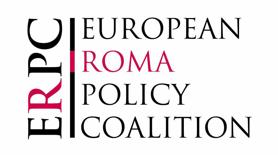31/01/2013
FSG
 In the context of the recently established EU Framework for NRIS and the adoption of NRIS by Member States, the work of the ERPC must now focus primarily on monitoring its concrete development by Member States as well as the EU policy agenda relevant to Roma issues.
In the context of the recently established EU Framework for NRIS and the adoption of NRIS by Member States, the work of the ERPC must now focus primarily on monitoring its concrete development by Member States as well as the EU policy agenda relevant to Roma issues.The FSG currently leads the European Roma Policy Coalition (ERPC)
In the first semester of 2013, the FSG is in charge of coordinating this lobbying platform of EU level non-governmental organisations (NGOs) in favour of Roma inclusion. The principal issues on its agenda are the growth of anti-gypsyism in Europe and the participation of Roma civil society in the development of the National Roma Integration Strategies (NRIS).
What is the ERPC?
The European Roma Policy Coalition (ERPC) is an informal gathering of NGOs operating at EU level on issues of human rights, anti-discrimination, anti-racism, social inclusion, and Roma and Travellers’ rights. Created in 2008, the ERPC is committed to improving the living conditions of Roma and to promoting Roma participation in all relevant processes affecting them. It has successfully lobbied, in cooperation with other public and private stakeholders, for the effective development of an EU Framework for NRIS.
The ERPC is constituted by Amnesty Internacional, the Open Society Foundations, the European Network Against Racism (ENAR), the Roma Education Fund (REF), the Fundación Secretariado Gitano (FSG), the European Roma Grassroots Organizations Network (ERGO), the European Roma Rights Centre (ERRC), the European Roma Information Office (ERIO), the Policy Centre for Roma and Minorities and the Minority Rights Group International.
The Coalition is chaired on a rotational basis among its member organisations. From January to July 2013, the FSG will act as chair, in close collaboration with ERIO and the ERRC.
In 2011, the work of the ERPC received official recognition in the European Public Affair Awards 2011 with the "Campaign of the Year" prize, for its awareness-raising efforts in the development of an EU Framework for NRIS.
Priorities of the ERPC for the first semester of 2013
The FSG has been a member of the ERPC since its creation and co-chaired it with ERGO in 2010. In the coming months, the FSG will assume responsibility for its activities and be its most visible face.
In the context of the recently established EU Framework for NRIS and the adoption of NRIS by Member States, the work of the ERPC must now focus primarily on monitoring its concrete development by Member States as well as the EU policy agenda relevant to Roma issues.
The FSG, as chair of the ERPC, is focusing on the following activities:
Given that the FSG does not have any office in Brussels and with a view to closely monitoring the EU agenda, we will count on the systematic support of other members present in the EU's capital.
The chairmanship will be transferred to the ERRC at the end of July.
